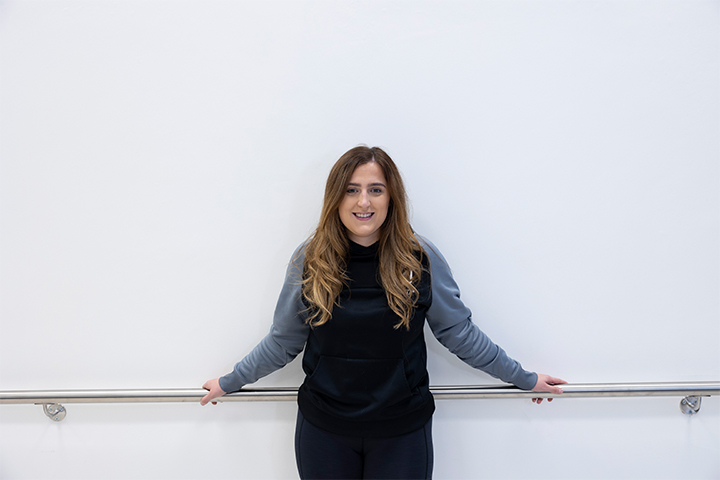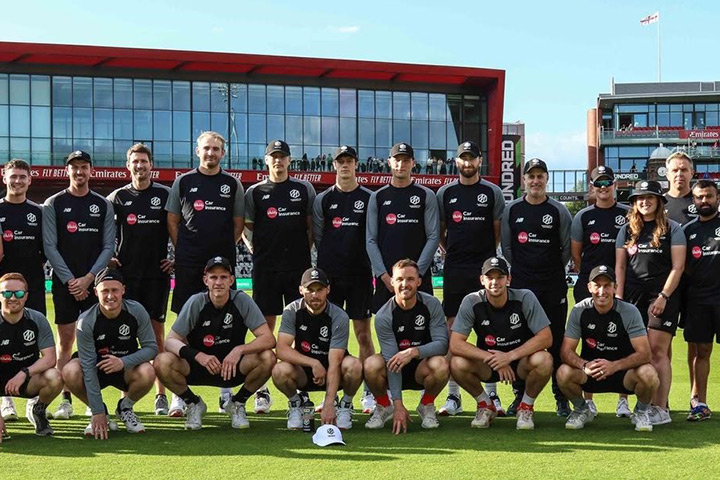
Megan
MPhysiotherapy - Sport and Exercise Medicine
Megan graduated from Bradford in 2022 with the MPhysiotherapy - Sport and Exercise Medicine degree.
As a talented ballet dancer, cheerleader, and general sports fan, to now working in her dream role providing physio support for cricket teams.
This is her story.
Born to do it
“I knew I wanted to be a physiotherapist from when I was about 14.”
"I grew up around sport and in the dance environment, performing ballet, modern and tap from the age of six.
"I carried on with ballet until I was 18, then took up cheerleading when I got to university.
"I’ve also grown up in a family of sport fans.
" I remember being at Oldham Athletic one day, taking a real interest in the person running on to the pitch to help an injured player.
"I asked my mum what their job was, and I knew then that being a physio was what I wanted to do.
"I spoke to my teacher about it and chose biology, chemistry and psychology at A level, to get my career plan going."
Planning the next steps
“I was the first person in my family to go to university.”
"I joined the BSc Sport Rehabilitation course at Bradford between 2015-2018, before taking a year out to figure out what I wanted to do next. If I worked in sports clubs it would need to be on a self-employed basis, and I couldn’t be as high level as I wanted to be. So I took the decision to go back to Bradford to do physio and reapplied for this integrated Master’s.
"The teaching staff knew me and what I wanted from my long-term career, and they advised me that the best thing I could do to become a qualified physio was to do this Master’s."

Hands-on experience
“We did four days of teaching a week, then Friday was spent on placement.”
"Because I’d mainly done the Year One modules as part of my undergraduate degree, they let me go straight into Year Two of the four-year Master’s course.
"Because of how aligned it was with my Sports Rehab course, I found the transition quite easy and settled in quickly, even though it was content-heavy going straight into Year Two. We were in five days a week, one of which was on placement at the on-site clinic at the University. I found that worked really well, as you could take what you’d learned in lectures that week and then apply it on placement day on Friday. This really really helped with revision and practicing different techniques.
"Having your first placement at the University is also really beneficial as you get the support of Uni without being thrown in at the deep end of a hospital environment.
"In Year Three, we did a cardiovascular respiratory module and a sports trauma module which were practical based. I completed an online placement where we were able to learn more about physio in the NHS, as well as deliver a neuro rehab session with a patient. It was here that I learned from specialists in their field about everything from dance to respiratory physio and what to expect when you’re on call.
"I was then placed with a sports club, where I worked with their physios, helping to put together rehab programmes for players and learning about the mental health of injured players, which I found fascinating."
The sports-specific modules set this course apart from other physio courses.
What sets Bradford apart
"Each year has a sport-specific module."
"You get to learn how to deal with pitch-side emergency situations, create programmes for enhancing sports performance, as well as learning about soft tissue and exercise principles and how to rehab different types of injuries.
"Bradford provided a really clear balance of core physio modules, and then the sports side made it more fun and made you want to go in and take part in practicals. You see all sides of physio on this course, in the NHS and in sport."

A good innings
“I got a job last summer working in cricket as a sports massage therapist.”
"Between third and fourth year, I began working in cricket and have worked in the Hundred Tournament for the Manchester Originals, as well as with Lancashire Men’s First Team and their academies, and for Thunder which is the regional women’s cricket team for the North West. At first I was the sports massage therapist, then this year I’ve been providing physio cover at games when required and supporting the lead physio on the recovery side.
"My plan when the cricket season ends soon is to look for a rotational position within the NHS, which are short 4–6-month roles working in different areas to get a broad range of experience.
"I’ve enjoyed placements in football and rugby so far as part of my course, but cricket is my passion; I’ve always loved watching it so I’m really fortunate to get the job that I’ve had, and have employers who are so keen to support my development as a physio."

This Master’s gives you so many more skills to become an amazing physio.
Worth the wait
"It’s worth putting the extra year’s study in"
"There is so much progression in physio and constant ways to move up, for example, through the NHS banding system, working in GP surgeries and hospitals, becoming a specialist in a certain area, or working in different areas of sport where there will always be a team you can work for.
"Bradford is the best place to give you a rounded, core knowledge of all areas of physiotherapy and sports medicine, to ensure you have the widest range of career options when you graduate. And then you’ve got a great career for life!"
Interested in MPhysiotherapy - Sport and Exercise Medicine?
Find out more and apply:
